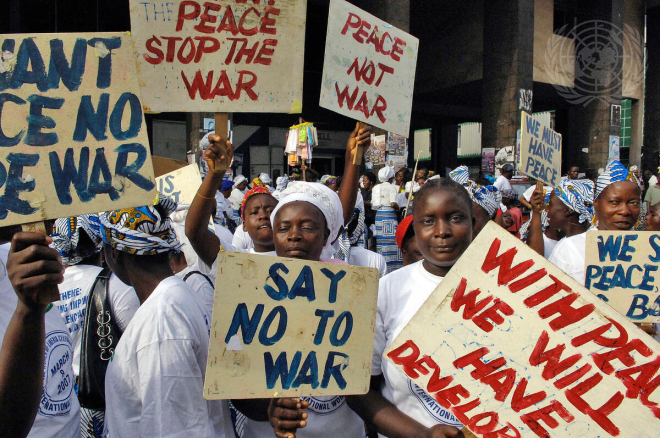A year ago, I closed a chapter on a 25-year journey at the Dutch government, where I worked on integration, migration, and security policies: complex and often contentious terrains. Joining WO=MEN, the Dutch Gender Platform, didn’t feel like leaving public service. It felt like expanding it. At
WO=MEN, I now stand at the intersection of policy, dialogue and advocacy, amplifying amongst other the voices of women from conflict zones, refugee camps, and grassroots movements. Defending democratic space for women’s rights and gender equality: not just in the Netherlands, but globally.
On this day, today the 31st of October, we commemorate that twenty-five years ago, a determined coalition of women peace activists, governments and United Nations representatives broke new ground for women and girls – and the world at large – at the United Nation’s Security Council.
What is Women, Peace and Security?
On 31 October 2000, a determined coalition of women, peace activists, governments, and UN representatives showed that gender equality is essential to lasting peace and global security, leading to the adoption of Resolution 1325, the foundation of the WPS agenda.
This milestone built on the momentum of the
1995 Fourth World Conference on Women in Beijing, where over 30,000 activists and 189 governments shaped the Beijing Declaration and Platform for Action, a transformative global agenda for gender equality. These women were not passive participants, they were architects of change.
Resolution 1325 was historic: for the first time the Security Council recognized women’s roles and rights in relation to peace and security. It called on member states to strengthen women’s participation in peace processes and protect them from violence before, during, and after conflict.
Since then, 113 countries - including the Netherlands - have adopted National Action Plans to implement the WPS agenda. But WPS is more than a policy framework. It is a peace and security imperative rooted in human rights, justice, and inclusive governance.
The WPS agenda exists: but are we taking adequate action?
The United Nations Security Council traditionally convenes its annual Open Debate on Women, Peace and Security (WPS) around the anniversary of Resolution 1325 on 31 October. However, in 2025, the Council unexpectedly rescheduled the debate to 6 October. This abrupt change, combined with ongoing U.S. visa restrictions and other barriers, significantly hindered the presence and participation of many women’s rights organizations in New York, particularly those who have been instrumental in shaping and advancing the WPS agenda. In his remarks, UN Secretary-General António Guterres
echoed this setback on his remarks regarding
the implementation of WPS:
- 676 million women and girls now live within 50 kilometers of deadly conflict — the highest number in 30 years.
- Casualties among women and children are now four times higher than two years ago.
- Sexual violence in conflict has surged by 87%, a brutal reminder that sexual violence continues to be used deliberately as a weapon as a strategic tool of war meant to destroy, displace and silence communities.
Unfortunately, these statitics are not isolated horrors. The UN article
War on Women: Time for Action to End Sexual Violence in Conflict adds further urgency. It documents how rape, sexual slavery, and forced sterilization are not incidental, but
systematically deployed strategies of war used in conflicts across amongst others Sudan, Congo, Mexico, Burma, Bosnia, and Palestine.
Despite the setbacks, women continue to lead local mediation efforts, shape new laws, and advance justice for survivors of gender-based violence. Their leadership is not optional, it is essential. Women are not just victims: they are strategists, negotiators, and defenders of human rights.
Shrinking space, growing urgency: Even at home
This isn’t just about far away setbacks for advocates for inclusive peace and security. In recent years, we’ve seen
civic space shrinking the Netherlands too. New laws threaten the right to protest. Public consultation is waning. Critical voices are increasingly dismissed. The Netherlands withdrew from the international Feminist Foreign Policy group. Cuts to legal and development aid for example might lead to reduced access to shelters, and an erosion of protections for survivors of domestic violence that than will disproportionately affect women.
The Dutch government insists that women’s rights remain a priority. But this will need the label, the infrastructure, and adequate dedicated funding, to become systemic instead of symbolic. Now more than ever, organisations and networks speak up. Not just as a watchdog for democratic values, but as a bridge between policy and people, between the local and the global.
The case for WPS: Strengthening national legislation
While global frameworks like Resolution 1325 have been pivotal in establishing the Women, Peace and Security (WPS) agenda, their success depends on robust national implementation. National Action Plans (NAPs) are the primary vehicles for translating international commitments into concrete, context-specific action. It would elevate their legal and political weight, ensuring they are not optional policy tools but enforceable obligations.
Crucially, the relationship between global WPS norms and national implementation is mutually reinforcing. NAPs give life to global commitments, ensuring that principles like women’s participation, protection, and access to justice are embedded in national laws, budgets, and institutions. At the same time, global frameworks gain legitimacy and strength when they are visibly and effectively implemented at the national level.
In short, national implementation is the bedrock of the WPS agenda.
Hope as strategy
Twenty-five years after Resolution 1325, we are at a crossroad. The principles are in place. The evidence is clear. We rely onthe political will to implement them fully and fairly. That’s why we need a future-proof WPS agenda, not only global but grounded in national action. When I transferred from government into civil society, I didn’t leave policy behind, I brought it with me.
What changed was the lens: from national to global, from institutional to intersectional. The Women, Peace and Security agenda is not just a framework I work on, it’s a promise I carry forward.
#ReclaimWPS25
Emine Kaya
Programmanager Gender, Peace and Security
